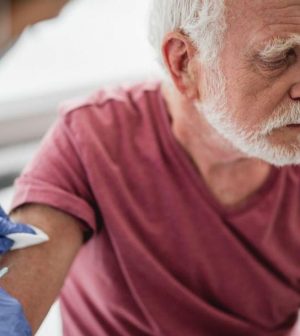- 7 Best Breads for Maintaining Stable Blood Sugar
- Gelatin vs. Collagen: Which is Best for Skin, Nails, and Joints?
- The Long-Term Effects of Daily Turmeric Supplements on Liver Health
- Could Your Grocery Store Meat Be Causing Recurring UTIs?
- Are You Making This Expensive Thermostat Error This Winter?
- Recognizing the Signs of Hypothyroidism
- 10 Strategies to Overcome Insomnia
- Could Artificial Sweeteners Be Aging the Brain Faster?
- Techniques for Soothing Your Nervous System
- Does the Water in Your House Smell Funny? Here’s Why
With Holidays Ahead, COVID Boosters a Must for People With Weak Immune Systems

If you’re a patient with a weakened immune system, roll up your sleeves to stay safe over the holidays and winter months.
“Immunocompromised patients absolutely should get a flu shot as well as an additional COVID-19 vaccine dose,” said Dr. Marwa Kaisey, a neuroimmunologist and assistant professor of neurology at Cedars-Sinai in Los Angeles.
“Otherwise, they are more likely to have worse outcomes if they get COVID-19 because they may not have built the same level of immunity from two doses of vaccine as those with healthy immune systems,” she said in a hospital news release.
The U.S. Centers for Disease Control and Prevention estimates that about 3% of U.S. adults (7 million) have moderately to severely compromised immune systems.
That makes them especially vulnerable to COVID and flu because they’re less able to mount an effective immune response to infections.
Immune systems can be weakened due to cancer, organ or bone marrow transplants, chronic diseases or medications for these conditions.
The CDC says immunocompromised people should get a third dose of Pfizer or Moderna vaccine at least one month after their second dose, and it’s fine to mix or match vaccines.
While many consider the terms “additional dose” and “booster shot” interchangeable, they’re actually different, Kaisey noted.
An additional shot is meant to give immunocompromised patients a level of protection similar to that of fully vaccinated people with healthy immune systems.
In contrast, a booster shot is given to fully vaccinated people whose protection against the virus is naturally wearing off over time, Kaisey explained.
When immunocompromised people should get an additional shot depends on their specific conditions.
“Timing decisions should be based on when patients take their immune-suppressing medications,” Kaisey said. “They should consult with their doctor to determine that.”
Dr. Stanley Jordan, director of Cedars-Sinai’s Nephrology and Transplant Immunology programs, said an additional dose is “very, very important for transplant patients.” That’s because they take medications that suppress their immune system in order to prevent organ rejection.
“After two vaccinations, only about 20%-30% of our transplant patients are positive for COVID-19 antibodies,” Jordan said, adding that this has caused great concern among transplant patients.
“A couple of excellent studies have found that patients got about a 60% immune response to the additional dose,” he said in the release. “We recommend that all of our patients get it.”
More information
The U.S. Centers for Disease Control and Prevention has more on immunocompromised people and COVID-19 vaccines.
SOURCE: Cedars-Sinai, news release, Dec. 1, 2021
Source: HealthDay
Copyright © 2026 HealthDay. All rights reserved.










